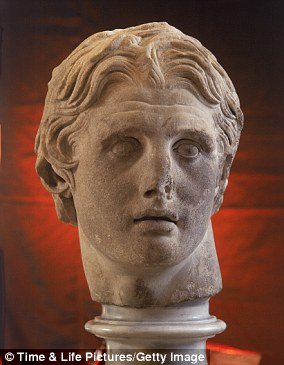Alexander the Great’s bathroom is discovered after 2,300 years: Archaeologists discover a room in Greece where the king bathed in a ‘homoerotic way with his teenage, testosterone-filled companions’
It is a palace that symbolized the golden age of antiquity, witnessing the assassination of King Philip II and the coronation of his twenty-year-old son, King Alexander the Great.
Located in the ceremonial center of the ancient Macedonian kingdom, the 15,000-square-meter Aigai Palace is three times the size of the Parthenon, with its enclosed city walls, courtyard, temples, shrines, theater, palaestra (or boxing gym) and tombs.
Now archaeologists have discovered the palace and bathroom where teenage Alexander bathed naked with his childhood companion, suspected lover and future military second-in-command Hephaestion.
The discovery, in the royal city of Aigai, in the modern city of Vergina, northern Greece, will be revealed in the final episode of the Channel 4 series Bettany Hughes’ Treasures of the World, airing on May 11.
“It is a special sight to see Aigai being excavated and renovated,” the presenter said.
Archaeologists have discovered the palace and bathroom where teenage Alexander bathed naked with his childhood companion, suspected lover and future military second-in-command Hephaestion

Alexander, the son of King Philip II of Macedon and Queen Olympias of Epirus, was one of the most ambitious military commanders of all time, famously declaring that he wanted to become “king of the world.”
‘There’s a huge drain cut into the rock and there’s a communal bathroom.
‘This is said to have been the place where Alexander the Great bathed with his companions – his famous favorite Hephaestion and all those young men who subsequently traveled with him on campaigns and feuded over his empire after his death.
“There were all these rites of passage that they went through.
“They were incredibly active in the gym, fighting and wrestling. They were trained to hunt.
‘Imagine those communal baths at the end of football matches.
‘It’s a truly visceral moment to imagine Alexander bathing in a beautifully homoerotic way with his teenage, testosterone-filled companions.

The discovery, in the royal city of Aigai, in the modern city of Vergina, in northern Greece, will be revealed in the final episode of the Channel 4 series Bettany Hughes’ Treasures of the World, airing on May 11.

Located in the ceremonial center of the ancient Macedonian kingdom, the 15,000 square meter Aigai Palace is three times the size of the Parthenon
‘His bedroom has not yet been identified, but all the rooms of the palace are present.
“So I haven’t entered Alexander’s bedroom yet, but I have entered his bathroom.”
Alexander, the son of King Philip II of Macedon and Queen Olympias of Epirus, was one of the most ambitious military commanders of all time, famously declaring that he wanted to become “king of the world.”
Under the guidance of the world-famous philosopher Aristotle, he and his group of fellow boys ascended the throne after his father was murdered by a bodyguard during the wedding of his sister Cleopatra.

The Palace of Aigai, built more than 2,300 years ago during the reign of Alexander the Great’s father, can be seen from above

Bettany Hughes’ Treasures of the World airs on Channel 4 on May 11 at 7pm
From his reign in 336 BCE until his death 13 years later, he built one of the greatest empires the world has ever seen, stretching from Greece to Egypt and deep into the Indian subcontinent.
Now, after a 16-year, €20 million project, the archaeological team has restored 1,400 square meters of banquet hall mosaics, marble floors and palace colonnades and discovered hundreds of precious artefacts.
Bettany was also given access to the tomb of Alexander’s sister Thessaloniki, who was buried in Aigai, which was plundered in ancient times.
“There was an incredible sepulchral beauty in it,” she added.
Bettany Hughes’ Treasures of the World airs on Channel 4 on May 11 at 7pm.

The discovery was made in the royal city of Aigai, in the modern city of Vergina, in northern Greece

